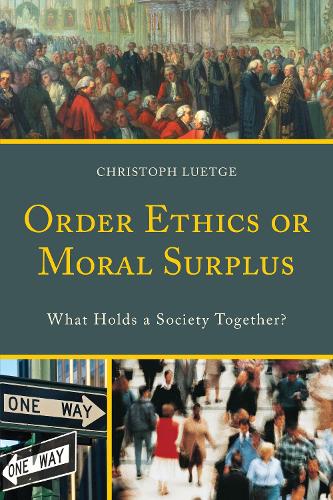
Order Ethics or Moral Surplus: What Holds a Society Together
(Hardback)
Available Formats
Publishing Details
Order Ethics or Moral Surplus: What Holds a Society Together
By (Author) Christoph Luetge
Bloomsbury Publishing PLC
Lexington Books
18th March 2015
United States
Classifications
Professional and Scholarly
Non Fiction
Social and political philosophy
170
Physical Properties
Hardback
262
Width 161mm, Height 233mm, Spine 24mm
526g
Description
Christoph Luetge takes on a fundamental problem of contemporary political philosophy and ethics. He questions the often implicit assumption of many contemporary political philosophers according to which a society needs its citizens to adopt some shared basic qualities, views or capabilities (here termed a moral surplus). Luetge examines the respective theories of, among others, Habermas, Rawls, Gauthier, Buchanan, and Binmore with a focus on their respective moral surpluses. He finds that each moral surplus is either not necessary for the stability of societies or cannot remain stable when faced with opposing incentives. Binmores idea of empathy is the only one that is, at least partly, not confronted with this dilemma. Luetge provides an alternative view termed order ethics, which weakens the necessary assumptions for modern societies and basically only relies on mutual advantages as the fundamental basis of society.
Reviews
Luetge's book aims to develop a system of ethics that replaces the language of sacrifice with that of investment. The problem he sets out to solve is how, given conditions of modern globalization and the basic fact that human beings will act in their own self-interest; can there be a system of ethics at all Much of the book is devoted to a discussion of contemporary ethical theories that rely on 'surplus moral value' that demands some degree of sacrifice. These theories cannot provide a stable foundation for society under conditions of modern globalization. Because it does not rely on individuals acting against their own interests, order ethics is a better candidate for providing social order. Luetge sees his theory in the same vein as Adam Smith, and he argues that his approach can address problems posed by game theory. The idea of understanding ethical actions as investments that leave everyone better off rather than a sacrifice that leaves one vulnerable to exploitation is interesting. He concedes that people will need education to understand their adherence to ethics this way . . . Summing Up: Recommended. Graduate and research collections. * CHOICE *
Order Ethics or Moral Surplus: What Holds a Society Together is a well-written, refreshing, and well-argued proposal of order ethics as a comprehensive ethical theory that represents an alternative to moral surplus theories. The critical edge of the book is full of provocative ideas that make the moral idealist think twice about his or her foundational beliefs and presuppositions. Indeed, the book is a much needed, lucid and wonderful presentation of the philosophy of order ethics to international readers. -- Jacob Dahl Rendtorff, Roskilde University
This book takes up an extremely important challenge: to find a common ethical ground that holds society together in a globalizing and pluralistic world. With its approach of order ethics, it offers a vigorous, consistent and thought provoking solution based on the enlightened self-interested attitudes and behaviors of the social actors. It critically discusses the proposals of world-famous Anglo-Saxon and German philosophers (leaving aside Asian and other voices). There is no doubt that the author, renowned for his edited masterwork Handbook of the Philosophical Foundations of Business Ethics, will stir up debates that will help to clarify and move forward the important challenge of finding a common ethical ground. This book is a must-read for all scholars and citizens concerned about the disintegration of societies in our time. -- Georges Enderle, University of Notre Dame
As a thoughtful observer of events on the world stage, Christoph Ltge poses a provocative question: "What holds a society together" In a meticulously reasoned response exploring the essence of social cohesion amid the centripetal force of globalization, Ltge asserts that mere compliance with social rules and norms is insufficient for a sustainable global social order. Rather, he argues that qualities and competencies of character often regarded as supererogatory create the "moral surplus" required for a coherent society. Ltge'stautly structured, accessible prosedraws from Hffe, Rawls, Hsle, Foot, Habermas, Gauthier, Locke, Nozick, Rorty, Buchanan, and Binmore to construct an original argument for moral surplus. Order Ethics or Moral Surplus: What Holds a Society Together is an illumining hermeneutical lens for viewing the complex dynamics of globalization. -- Lindsay J. Thompson, Johns Hopkins University
Author Bio
Christoph Luetge is Peter Lscher Professor of Business Ethics at Technische Universitt Mnchen.
